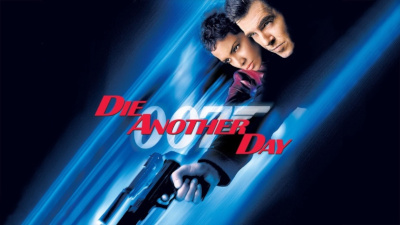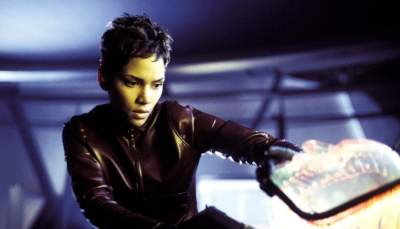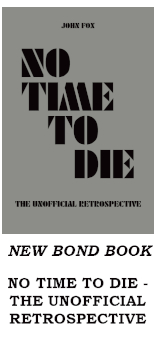|
A Reappraisal of ‘Die Another Day’ 
There
are plenty of reasons to like or dislike Die Another Day, Pierce
Brosnan’s unexpected and involuntary swan song to the franchise. Scroll
into a couple of forums and you’ll find all the reasons to dislike it,
most of the justifications use the words “invisible car” or “CGI” quite
a lot. This is why, as if my books Beyond The Ice: The Case For and
Against Die Another Day and a couple of articles weren’t enough, I have
decided to write this article. Let’s be honest – the most obvious
excuse is the 20th anniversary this week.I
will start by saying that the Lee Tamahori film went up and down in my
rankings. I remember loving it when I first saw it on the big screen
(January 2003 in my native Argentina) and then disliking it quite a lot
as it reached home video. Yes, the slow-motion effects and speed ramps
felt a bit too much for Bond’s subtlety, and then there’s the overload
of CGI. Yet again, in hindsight, I feel all of these tropes were very
characteristic of the productions released during the first lustrum of
the new millennium, films like Mission: Impossible 2 (2000) and
Swordfish (2001). In almost every big action film I can recall
Hollywood toying with computer-generated graphics and rubbing all these
new technologies in the audience’s face, perhaps as a way to make it
very clear that we were in a new millennium and there’s more technology
out there than your Compaq Presario 2100 PC or your Nokia 3310 cell
phone. Despite my young age, I
don’t remember this film has been universally panned as people say.
Certainly, it was very far from killing the franchise with a gross of
over 431 million dollars. MGM was very enthusiastic with this result
and as early as 2003 one of its top executives said Die Another Day was
“the winning formula”. The fact that a Jinx spin-off was planned and
even scripted is proof that there were elements that the public has
accepted well. Moreover, the reviews ranged from mixed to positive:
yes, critics complained of the CGI and some exaggerated stunts and
pointed out that this should be toned down in the following instalments
of the series. This would have been possible while keeping Pierce
Brosnan as Bond without rebooting the series, let’s not forget Roger
Moore played the role in the more grounded For Your Eyes Only after the
more spectacular Moonraker, but for some reason –probably associated
with the possibility of adapting Casino Royale– the Bond that
introduced a new generation was unceremoniously axed for the role and
so entered the Bond who cremated himself without the intervention of
Slumber, Inc. after five films in fifteen years.Going
back to the reviews, there is one that particularly got my attention:
it comes from Entertainment Weekly’s Owen Gleiberman, who called Die
Another Day “the savviest and most exciting Bond adventure in years”
and was one of Pierce Brosnan’s biggest detractors when GoldenEye was
released in 1995. What is very interesting about Gleiberman’s views on
the 2002 adventure is that he points out that this is the only film
where the future of James Bond is at stake – and he is indeed right.Bond
infiltrates North Korea, gets captured, tortured, almost shot but
finally exchanged and then… “You’re no use to anyone now”, M dixit.
Just wow. When was James Bond in this position before? We remember that
in Licence To Kill he antagonized his own people, they considered him a
liability when he went out for revenge and M insisted that “he’s got to
be stopped”, but this case is completely different: Bond is not
considered as a risk, but as a spent force and sent for reevaluation.
While soldiers imprisoned behind enemy lines and returned home were
welcomed and congratulated by the president, a spy is treated as an
expendable tool. Ian Fleming himself said, in a 1963 interview, that
“espionage was a dirty trade” and it was frequently romanticized by his
readers. The Bond films themselves romanticized espionage in “one-man
army” stories. But Die Another Day does something different by
establishing that a spy is treated differently upon failure, as an
anonymous tool of the government. A rather realistic approach when we
think about it. The
film receives a lot of criticism for the abuse of gadgets, yet Bond
goes gadgetless and without MI6 support for at least one hour of the
film. While Jinx infiltrates the Álvarez Clinic by getting an official
admission ticket and uses a C4 detonator hidden in her cell phone, 007
has to find a way to get to the island and find Zao with nothing more
than a sleeper agent contact and his “old friends”, and an inventory
that includes little more than a 1957 Ford Fairlane, a Smith &
Wesson revolver and a pair of binoculars. Jinx takes a straighter path
to Los Órganos, Bond needs to put a crook to sleep and steal his
admission tickets. As for the rest of the film, none of the other
gadgets can inflict serious damage to anyone (ultrasonic ring to
shatter glass, underwater mini-breather, laser watch). The deadliest
gadgets Bond has used are on Aston Martin Vanquish, and when he uses
those, he’s tailed by an enemy agent who has almost the same arsenal on
his Jaguar XKR, so… we have a much more fair fight than when Bond used
the BMW 750il against Carver’s goons or the Aston Martin DB5 against
Goldfinger’s Korean guards or his Lotus Espirit when chased by Jaws and
three nobodies in a black Ford over the roads of Sardinia. And
then comes the political aspect of the plot, which is indeed something
that can’t be ignored – a group of Korean protestors certainly didn’t
when the film was screened there!Clearly
inspired by Ian Fleming’s Sir Hugo Drax from Moonraker, Colonel Moon is
a zealous North Korean leader whose biggest dream is to “see the South
ruled by the North” to begin with. Further ambitions include making
“the West shake with fear”, threats we have frequently heard in the
aftermath of 9/11. Moon goes to the extreme, after being presumed dead,
to use gene therapy to become a British philanthropist known as Gustav
Graves and attract the West with his flamboyance and swagger. Not only
he is politically connected, as M describes, but he has a mole inside
MI6 –Miranda Frost– who can misinform British Intelligence and help him
win precious time. One of her tasks was to blow Bond’s cover and give
Moon time to emerge as a perfect Western citizen, striking right under
their noses. Mohammed Atta, the Egyptian engineer who crashed plane
AA11 on the World Trade Center’s north tower, could easily get a US
visa after living and studying in Hamburg for years and was perfectly
immersed in Western society. Just like Atta, Moon also received an
education in the West – Oxford and Harvard.No
Bond villain was ever closer to provoking World War Three than him. By
the last third of the film, Moon/Graves is so untouchable that the best
American technology can’t defeat his Icarus satellite and the threat is
so huge that American and South Korean troops are ready to cross the
38th parallel. The United States is at a DEFCON-2 state. A North Korean
officer has a satellite weapon that can destroy incoming missiles in
automatic, and melt any region of the world and he isn’t doing this for
money but out of the thirst for conquest. He just wants the West to
melt. And our only hope relies on Bond and Jinx.In
his 2002 State of the Union address, George W Bush included North Korea
in an “axis of evil” along with Iran and Iraq. I can positively
remember that, as far as Argentina, people were scared to have lunch at
McDonald’s or walk next to the US Embassy, all products of the 2001
attacks. I can remember people being worried that the next Bond film
will deal with this subject and even screenwriters Neal Purvis and
Robert Wade changed things in the script, scrapping an original idea
where CIA agents turned against his handlers. Then came all the
concerns (which didn’t affect me much, given where I am located) about
the National Security Agency reading private correspondence to prevent
potential threats. Die Another
Day mixed both things: the fear of someone from this “axis of evil”
having a nefarious design against the West and the prominence of the
NSA in the war on terror: I came to learn the NSA is not an enforcement
agency, yet this film made the heroine Jinx someone from this agency
instead of a CIA agent. We also have a couple of arguments between the
Americans and the British, the former clearly wanting to command the
latter to “put the house in order”.Despite
all of these justifications, which I think are pretty logical, Die
Another Day still doesn’t get much love from the fandom or filmgoers
that even with a PhD still repeat that “the film was too campy for a
9/11 world” and that “it nearly killed the franchise”. I’m really
surprised that all these topics mentioned here are frequently ignored
by reviewers of this film, which I consider by far the darkest of the
Pierce Brosnan era and I love them all. I’m ten times more surprised
when I see people listing a film where Bond is humiliated and pushed to
suicide per request of the actor playing him in the name of “realism”
when not everything in that era is that grounded on reality (hey, that
sniper bullet, fall of a bridge and drowning must have hurt). But then
again, that’s a subject for another article.Happy 20th anniversary, Die Another Day!
Nicolás Suszczyk
© 2022
Alternative 007
|



|





